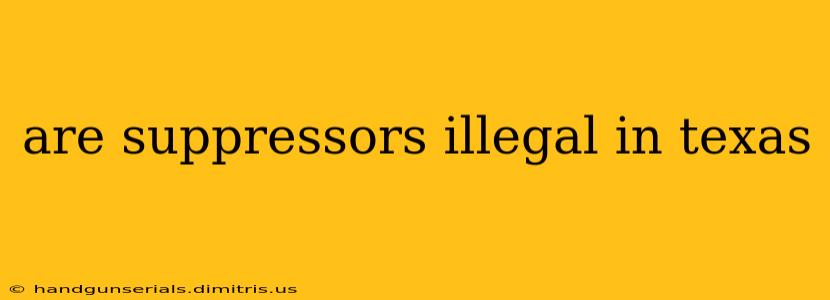The legality of suppressors, often mistakenly called silencers, in Texas is a complex issue with nuances that require careful understanding. While the term "silencer" is commonly used, the official term is "firearm suppressor," and this distinction is important when researching the law. This post will clarify the regulations surrounding firearm suppressors in the Lone Star State.
Texas Law on Firearm Suppressors
Texas law allows for the legal possession and use of firearm suppressors by individuals who meet specific criteria. However, it's crucial to understand that owning a suppressor involves navigating both state and federal regulations. Failure to comply with either can result in severe penalties.
Federal Regulations: The National Firearms Act (NFA)
The primary governing body for firearm suppressors is the federal government through the National Firearms Act (NFA) of 1934. This act mandates that all suppressors be registered with the Bureau of Alcohol, Tobacco, Firearms and Explosives (ATF) and requires individuals to obtain a tax stamp before legal possession. This process involves a background check and a significant waiting period.
Therefore, regardless of Texas state law, the NFA regulations must be adhered to. Possessing a suppressor without the proper ATF registration and tax stamp is a federal crime, carrying substantial penalties including imprisonment and hefty fines.
Texas State Regulations: A Supportive Stance
Texas has taken a relatively permissive approach to firearm suppressors compared to some other states. Texas law does not prohibit the possession of legally registered suppressors. However, it's essential to reiterate that state law compliance doesn't negate the absolute necessity of adhering to federal NFA regulations.
Obtaining a Firearm Suppressor Legally in Texas
The process of obtaining a suppressor legally in Texas mirrors the federal process:
-
ATF Form 1 or Form 4: You must complete the relevant ATF form. Form 1 is for individuals making their own suppressor, while Form 4 is for purchasing a commercially manufactured suppressor from a licensed dealer.
-
Background Check: A thorough background check will be conducted by the ATF.
-
Tax Stamp: A substantial tax is levied on the suppressor, and a tax stamp is issued upon approval of the application.
-
Waiting Period: Expect a significant waiting period, often several months, before the ATF approves your application and you can take possession of your suppressor.
-
Compliance with all applicable state and local laws: Beyond state and federal regulations, remember to check any local ordinances that might place further restrictions on suppressor ownership or use.
Common Misconceptions About Suppressors in Texas
- Silencers completely eliminate sound: This is a common misconception. Suppressors significantly reduce the sound of a firearm, but they don't eliminate it entirely.
- Suppressors are only for illegal activities: Suppressors have legitimate uses, including hunting, target shooting, and hearing protection.
- Texas law makes suppressors easily accessible: While Texas doesn't actively prohibit them, the stringent federal regulations still make obtaining a suppressor a lengthy and involved process.
Conclusion: Knowledge is Key
The legality of suppressors in Texas hinges on strict compliance with both state and, critically, federal law. Understanding the requirements of the NFA and the ATF application process is paramount. Before considering purchasing a suppressor, thoroughly research all applicable regulations and seek professional guidance if needed. Ignorance of the law is not a defense, and failure to comply can lead to serious legal consequences. Always consult with legal counsel specializing in firearms regulations before making any decisions.

